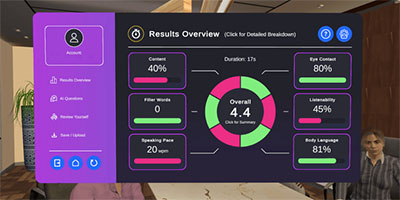Practice Interview Skills
Improve your interview skills with interactive practice exercises and AI-powered feedback on performance.
Interview roleplays
Practice your interview skills with AI-powered avatars, and receive feedback on your interview.
Roleplays:
- Interview on Uploaded Resume + Job Desc.
- Recruiter: Interviewing a Candidate
- Panel Interview (Multi-Avatar)
- General Interview (Open-Ended)
- Higher Education Interview (Open-Ended)
- Interview for a Company
- Behavioral Interview - STAR Technique
Custom Roleplays:
Build your own roleplays with Roleplay Studio.
The roleplay learning journey
1. Practice with roleplays
Practice your interview skills in a manner that mimics real-life interactions.

2. Feedback on your interview
Receive instant AI-powered feedback on your roleplay interview.

3. Reflect with a coach
Reflect on your performance with your personal AI coach.
Topics covered
- Interview skills.
- Competency questions.
- Confidence.
- Asking questions.
Accessibility
The interview roleplays can be accessed from your web browser, no installation or download is required. You can also access the scenarios from virtual reality, if you have a VR headset.